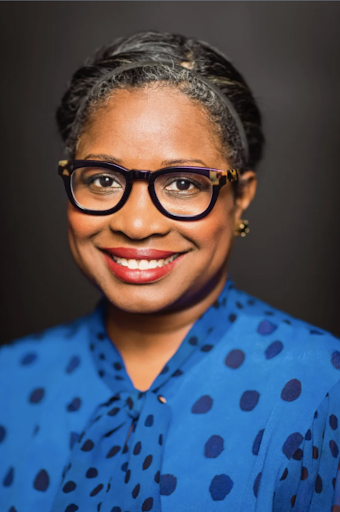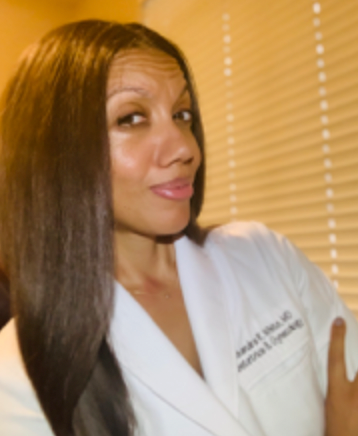

The Centers for Disease Control and Prevention estimate that roughly 100,000 people in the United States are living with a Sickle Cell Disease, though the real number is likely much higher. People living with Sickle Cell Disease are disproportionately Black or African-American, contributing to a well-documented issue in modern medicine: access to adequate screening and care for historically marginalized communities. When the future Dr. Melissa Creary opened her AP Biology textbook to see a section that addressed Sickle Cell Disease, she felt seen. She also understood that the small section in her book fell far short of what it was like to live with the condition.
Dr. Creary, an Assistant Professor of Health Management and Policy at the University of Michigan, describes her path as ‘non-linear’, having started with a general interest in science. That general interest developed into an interest in the ways that cells operated as organisms within society. At Emory University, she earned a Bachelor’s in Biology, and after earning a Master’s in Public Health in Behavioral Science and Health Education, she spent nearly a decade at the Centers for Disease Control and Prevention. While she was with the CDC, her work in creating the first national Sickle Cell Disease data collection program caught the attention of the Brazilian Ministry of Health.
“All the time that I spent in Brazil and the development of my research has been amazingly formative for my current conceptual framework, ‘Bounded Justice’, which…has allowed me to think…in terms of a contemporary view of justice and equity, and what the limits of equity are.” Dr. Creary reflected. “But while Brazil was looking to the US for data collection and how to address accessibility, the US could learn from the way that Brazil’s structural and institutional racism affects public policy and accessibility.”
Well-documented in Dr. Creary’s global research and subsequent course material is the fact that the true toll of Sickle Cell Disease is unknown due to a wide dearth of medical infrastructure that can provide proper screening of newborns, as well as stigma attached to the disease in some countries. “No one thinks Sickle Cell Disease is a problem because no one can identify who’s dying from Sickle Cell Disease,” she said, mentioning that the burden is particularly heavy on the African continent. The sickle-cell trait emerged as an evolutionary response to malaria, as the trait makes cells resistant to the disease machinations of malaria.
The issues faced by Brazilians living with Sickle Cell Disease are not unlike issues faced by people in the US who have Sickle Cell Disease – overall, the disease state is behind in both treatment options and in advancements. “The health disparities in both countries are similar,” Dr. Creary said, “We know that receiving care from people who look like you will lead to better health outcomes. In the US, there is a higher number of Black and brown students in medical school, but they still only make a small percentage of what we actually need.”
These disparities in the treatment and wider national understanding of Sickle Cell Disease in both Brazil and in the US informed Dr. Creary’s mission to teach about how these issues of how science, culture, and policy intersect, and how science and culture influence each other. The ‘Bounded Justice’ framework focuses on how the cumulative effects of marginalization undermine the inherent need for medical and social justice in the overall neglected state of treatment for Sickle Cell Disease. Through multiple research projects triggered by the COVID-19 pandemic, Dr. Creary further contextualizes the importance of anti-racist research and pedagogy in the fight against Sickle Cell Disease.
“If we exist in a racist world, then the classroom exists in a racist world. So, how do we teach with that knowledge being open? And how does racism seep into how we teach, and what we teach?” Dr. Creary mentioned that these factors affect how we think and teach about data, environmental science, nutrition, health policy and health management, all public health concerns that can’t be divorced from larger societal issues that are also affected by racism. “Often when we try to develop equitable programs and policies, we do so without providing the deep equity that’s necessary, and very often we’re not able to provide that because we’re not talking long enough or meaningfully enough with the communities to which we’re providing equity.”
Dr. Creary was supported by a village of Black woman mentors who taught her to be brave, including Dr. Althea Grant who paved the way for Dr. Creary during her time at the CDC, and Drs. Chandra Ford and Camara Jones, whose tenacity in addressing healthcare inequalities inspire her to this day. She is excited to push forward with Bounded Justice, study more deeply about trust and Sickle Cell Disease, justice, and curative therapies currently under review by the FDA. “What are these therapies going to do? What are the social, ethical, and legal implications of these therapies? What are the implications of living with Sickle Cell Disease once they’ve been cured? I’m really interested in how we make these therapies accessible to people living with the disease, and how we’re talking about providing this care and this technology from a social justice space, and how far social justice can take us.”
Dr. Creary sees this exciting new possibility and is already asking questions about the long-term impacts, if these treatments are approved, and widely successful.
“I don’t think there’s been enough research on what it means to be cured. One of the things I’m interested in is what does a scientific cure look like when you can’t cure racism? How do you walk in the world being biologically cured, but not much else has changed?”
Despite her concerns surrounding equity and access, Dr. Creary knows that these treatments have been transformative, and eagerly awaits the next steps.
Learn more about Dr. Melissa Creary
Website for Dr. Melissa Creary
Alexandria Hicks is a writer of prose, healthcare, and advertising. Born and raised in Nashville, Tennessee, she’s lived in Los Angeles, California and Houston, Texas. She currently calls New York City home.


